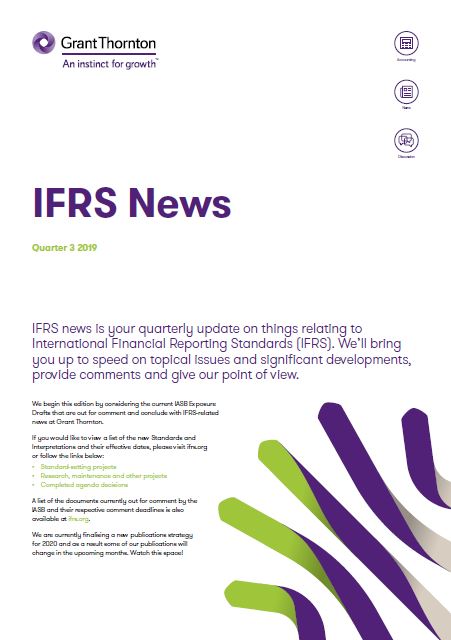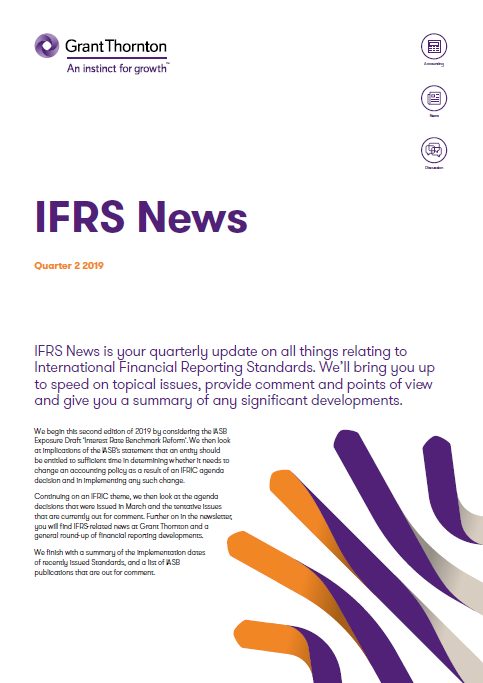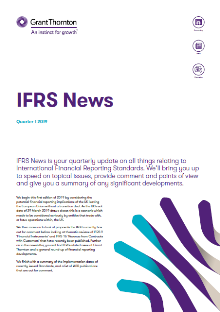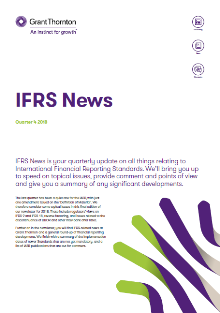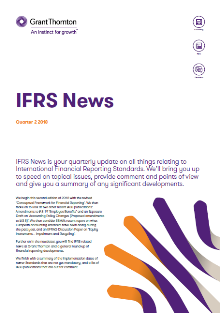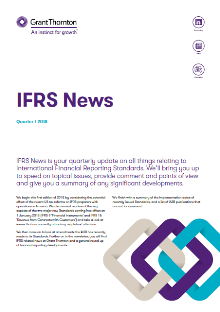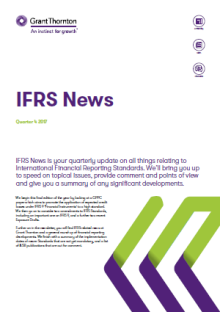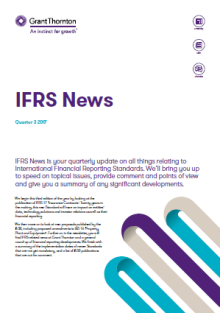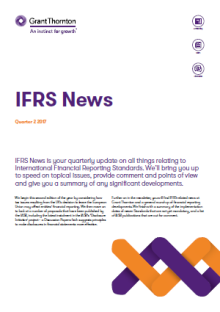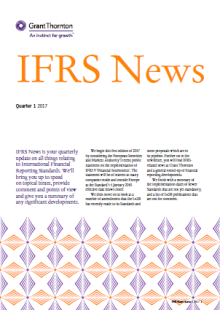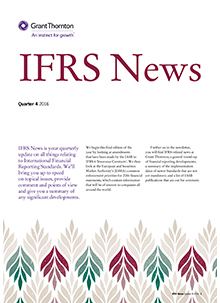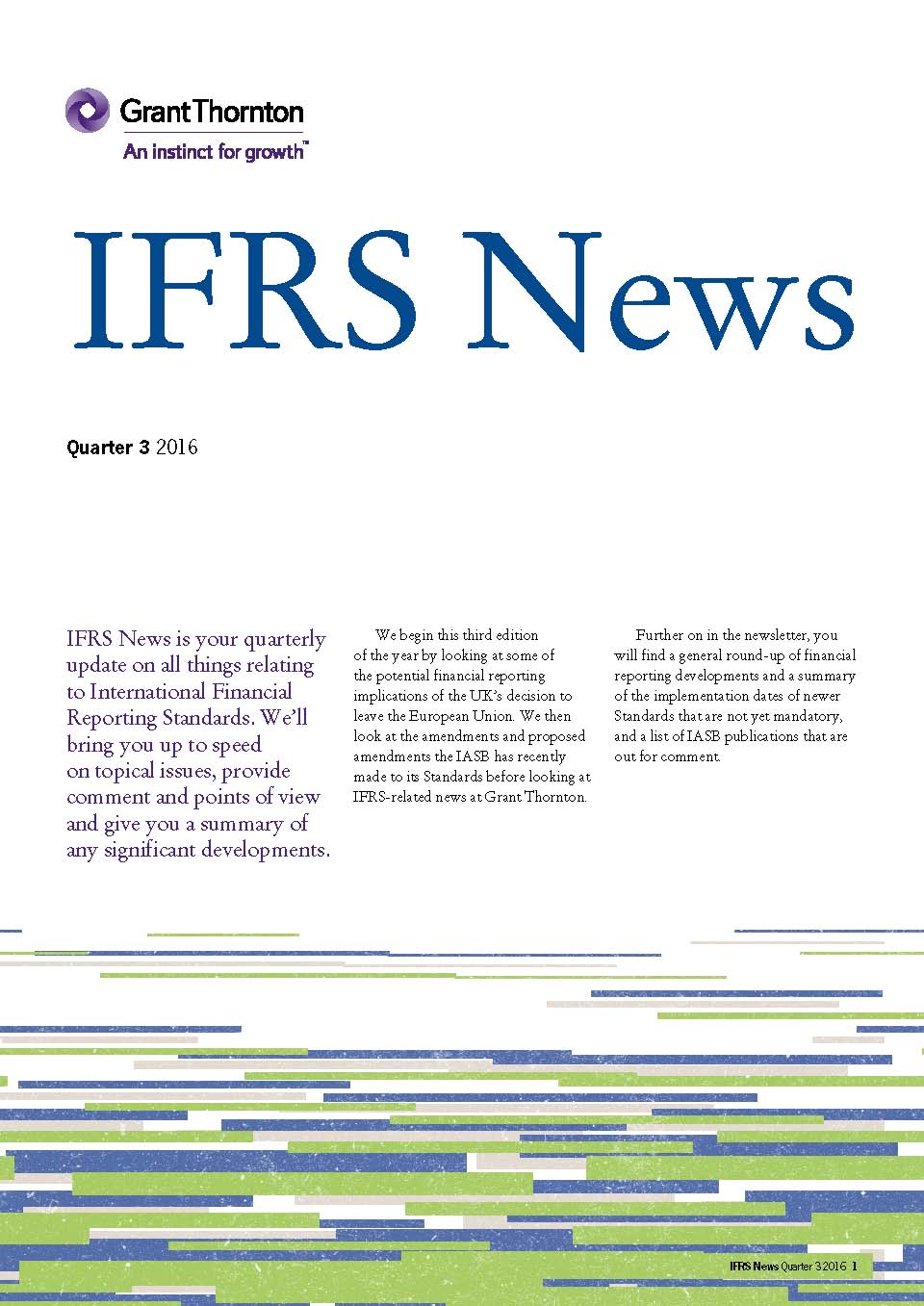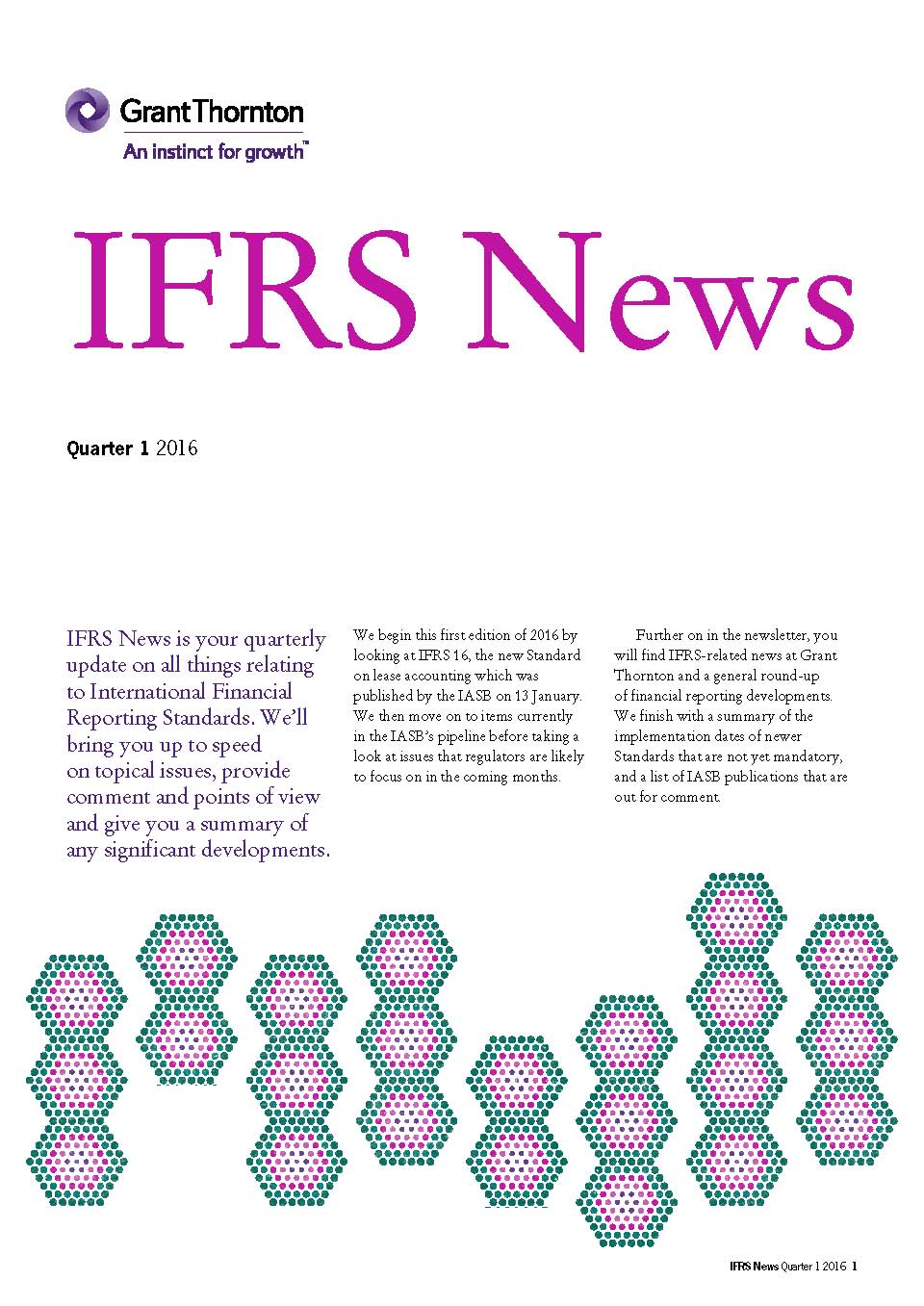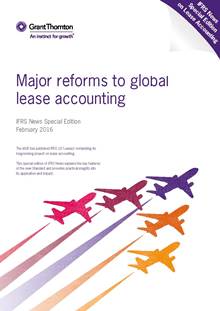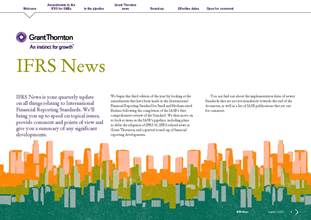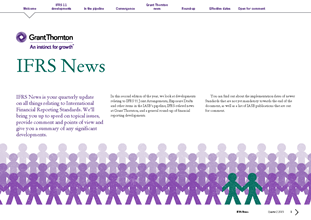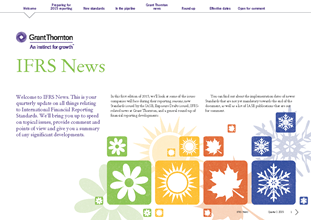IFRS News is a quarterly publication by the Grant Thornton International Financial Reporting Standards team and it provides a global insight into developments in International Financial Reporting Standards. These developments have a direct impact on Australia since our standards mirror the international ones, albeit with a slightly different numbering system. In addition to the quarterly release from time to time the IFRS team also publish Special edition newsletters focussing on major IFRS developments. Click here to view the list of special editions.
IFRS 2019 3rd Quarter
In this edition of IFRS News, we begin by considering the current IASB Exposure Drafts that are out for comment and conclude with IFRS-related news at Grant Thornton. If you would like to view a list of the new Standards and Interpretations and their effective dates, please visit ifrs.org or follow the links below:
A list of the documents currently out for comment by the IASB and their respective comment deadlines is also available at ifrs.org.
IFRS 2019 2nd Quarter
We begin this second edition of 2019 by considering the IASB Exposure Draft ‘Interest Rate Benchmark Reform’. We then look at implications of the IASB’s statement that an entity should be entitled to sufficient time in determining whether it needs to change an accounting policy as a result of an IFRIC agenda decision and in implementing any such change.
Continuing on an IFRIC theme, we then look at the agenda decisions that were issued in March and the tentative issues that are currently out for comment. Further on in the newsletter, you will find IFRS-related news at Grant Thornton and a general round-up of financial reporting developments.
We finish with a summary of the implementation dates of recently issued Standards, and a list of IASB publications that are out for comment.
IFRS 2019 1st Quarter
We begin this first edition of 2019 by considering the potential financial reporting implications of the UK leaving the European Union without a transition deal. As the UK’s exit date of 29 March 2019 draws closer, this is a scenario which needs to be considered seriously by entities that trade with, or have operations within, the UK.
We then move on to look at proposals the IASB currently has out for comment before looking at thematic reviews of IFRS 9 and IFRS 15 that have recently been published. Further on in the newsletter, you will find IFRS-related news at Grant Thornton and a general round-up of financial reporting developments.
IFRS 2018 4th Quarter
The last quarter has been a quiet one for the IASB, with just one amendment issued on the ‘Definition of Material’. We therefore consider some topical issues in this final edition of our newsletter for 2018. These include regulators’ views on IFRS 9 and IFRS 15, reverse factoring, and issues related to the discontinuance of LIBOR and other inter-bank offer rates.
IFRS 2018 3rd Quarter
We begin this third edition of 2018 with the IASB’s major new Discussion Paper ‘Financial Instruments with Characteristics of Equity’. This contains proposals that would alter the process for classifying financial instruments issued by an entity as either financial liabilities or equity.
We then move on to consider the likely outcome of Argentina being declared hyperinflationary in the second half of 2018, and the effects this would have. The accounting implications of such a large economy being considered hyperinflationary for IFRS purposes are likely to be felt well beyond Argentina itself, and we encourage clients with operations there to start preparing for the change now.
IFRS 2018 2nd Quarter
We begin this second edition of 2018 with the revised ‘Conceptual Framework for Financial Reporting’. We then move on to look at two other recent IASB publications: Amendments to IAS 19 ‘Employee Benefits’ and an Exposure Draft on ‘Accounting Policy Changes (Proposed amendments to IAS 8)’. We then consider ESMA’s recent report on what European accounting enforcers have been doing during the past year, and an EFRAG Discussion Paper on ‘Equity Instruments – Impairment and Recycling’.
IFRS 2018 1st Quarter
We begin this first edition of 2018 by considering the potential effect of the recent US tax reforms on IFRS preparers with operations in America. We also remind readers of the key aspects of the two major new Standards coming into effect on 1 January 2018 (IFRS 9 ‘Financial Instruments’ and IFRS 15 ‘Revenue from Contracts with Customers’) and take a look at issues that are currently attracting regulators’ attention.
We then move on to look at amendments the IASB has recently made to its Standards. Further on in the newsletter, you will find IFRS-related news at Grant Thornton and a general round-up of financial reporting developments.
We finish with a summary of the implementation dates of recently issued Standards, and a list of IASB publications that are out for comment.
IFRS 2017 4th Quarter
We begin this final edition of the year by looking at a GPPC paper which aims to promote the application of expected credit losses under IFRS 9 ‘Financial Instruments’ to a high standard. We then go on to consider two amendments to IFRS Standards, including an important one on IFRS 9, and a further two recent Exposure Drafts.
Further on in the newsletter, you will find IFRS-related news at Grant Thornton and a general round-up of financial reporting developments. We finish with a summary of the implementation dates of newer Standards that are not yet mandatory, and a list of IASB publications that are out for comment.
IFRS 2017 3rd Quarter
We begin this third edition of the year by looking at the publication of IFRS 17 ‘Insurance Contracts’. Twenty years in the making, this new Standard will have an impact on entities’ data, technology solutions, and investor relations as well as their financial reporting.
We then move on to look at new proposals published by the IASB, including proposed amendments to IAS 16 ‘Property, Plant and Equipment’. Further on in the newsletter, you will find IFRS-related news at Grant Thornton and a general round-up of financial reporting developments. We finish with a summary of the implementation dates of newer Standards that are not yet mandatory, and a list of IASB publications that are out for comment.
IFRS 2017 2nd Quarter
We begin this second edition of the year by considering how tax issues resulting from the UK’s decision to leave the European Union may affect entities’ financial reporting. We then move on to look at a number of proposals that have been published by the IASB, including the latest instalment in the IASB’s ‘Disclosure Initiative’ project – a Discussion Paper which suggests principles to make disclosures in financial statements more effective.
Further on in the newsletter, you will find IFRS-related news at Grant Thornton and a general round-up of financial reporting developments. We finish with a summary of the implementation dates of newer Standards that are not yet mandatory, and a list of IASB publications that are out for comment.
IFRS 2017 1st Quarter
We begin this first edition of 2017 by considering the European Securities and Markets Authority’s recent public statement on the implementation of IFRS 9 ‘Financial Instruments’. The statement will be of interest to many companies inside and outside Europe as the Standard’s 1 January 2018 effective date draws closer. We then move on to look at a number of amendments that the IASB has recently made to its Standards and some proposals which are in its pipeline.
Further on in the newsletter, you will find IFRS related news at Grant Thornton and a general round-up of financial reporting developments. We finish with a summary of the implementation dates of newer Standards that are not yet mandatory, and a list of IASB publications that are out for comment.
We finish with a summary of the implementation dates of newer Standards that are not yet mandatory, and a list of IASB publications that are out for comment.
IFRS News fourth quarter 2016
We begin this final edition of the year by looking at amendments that have been made by the IASB to IFRS 4 ‘Insurance Contracts’. We then look at the European and Securities Market Authority’s (ESMA) common enforcement priorities for 2016 financial statements, which contain information that will be of interest to companies all around the world.
Further on in the newsletter, you will find IFRS-related news at Grant Thornton; a general round-up of financial reporting developments; a summary of the implementation dates of newer Standards that are not yet mandatory; and a list of IASB publications that are out for comment.
IFRS News third quarter 2016
We begin this third edition of the year by looking at some of the potential financial reporting implications of the UK’s decision to leave the European Union. We then look at the amendments and proposed amendments the IASB has recently made to its Standards before looking at IFRS-related news at Grant Thornton.
Further on in the newsletter, you will find a general round-up of financial reporting developments and a summary of the implementation dates of newer Standards that are not yet mandatory, and a list of IASB publications that are out for comment.
IFRS News second quarter 2016
In this edition we look at changes that have been made to IFRS 15 'Revenue from Contracts with Customers' before turning to other recent amendments published by the IASB.
We then remind you of a couple of major pronouncements that some companies will be applying for the first time, before going on to discuss two major Grant Thornton publications that have been issued in the last quarter.
Further on in the newsletter, you will find IFRS-related news at Grant Thornton and a general round-up of financial reporting developments. We finish with a summary of the implementation dates of newer Standards that are not yet mandatory, and a list of IASB publications that are out for comment.
IFRS News first quarter 2016
We begin this first edition of 2016 by looking at IFRS 16, the new Standard on lease accounting which was published by the IASB on 13 January. We then move on to items currently in the IASB’s pipeline before taking a look at issues that regulators are likely to focus on in the coming months.
IFRS News Special Edition on lease accounting - Major reforms to global lease accounting
The IASB has published IFRS 16 'Leases' completing its long-running project on lease accounting.
This special edition of IFRS News explains the key features of the new Standard and provides practical insights into its application and impact.
IFRS News fourth quarter 2015
Our fourth edition of 2015 looks at:
- the deferral of the effective date of IFRS 15 ‘Revenue from Contracts with Customers’
- further targeted changes to IFRS 15
- IFRS related news at Grant Thornton
- general round-up of financial reporting developments
IFRS News third quarter 2015
Our third edition of 2015 looks at:
- amendments that have been made to the International Financial Reporting Standard for Small and Medium-sized Entities following the completion of the IASB’s first comprehensive review of the Standard
- items in the IASB’s pipeline, including plans to defer the adoption of IFRS 15
- IFRS-related news at Grant Thornton
- a general round-up of financial reporting developments
- the implementation dates of newer Standards that are not yet mandatory
- a list of IASB publications that are out for comment
IFRS News second quarter 2015
In this second edition of the year, we look at developments relating to IFRS 11 Joint Arrangements; Exposure Drafts and other items in the IASB’s pipeline; IFRS-related news at Grant Thornton; and a general round-up of financial reporting developments.
You can find out about the implementation dates of newer Standards that are not yet mandatory towards the end of the document, as well as a list of IASB publications that are out for comment.
IFRS News first quarter 2015
In this first edition of 2015, we’ll look at some of the issues companies will face during their reporting seasons; new Standards issued by the IASB; Exposure Drafts issued; IFRS related news at Grant Thornton; and a general round-up of financial reporting developments.
You can find out about the implementation dates of newer Standards that are not yet mandatory towards the end of the document, as well as a list of IASB publications that are out for comment.
IFRS News (November 2014)
In this fourth and final edition of 2014, we’ll cover areas that regulators are likely to be focussing on in the forthcoming reporting season; new Standards issued by the IASB; Exposure Drafts issued; IFRS-related news at Grant Thornton; and a general round-up of financial reporting developments.
You can find out about the implementation dates of newer Standards that are not yet mandatory towards the end of the document, as well as a list of IASB publications that are out for comment.
IFRS News (September 2014) - Special edition on IFRS 9: Financial Instruments
Following several years of development, the IASB has finished its project to replace IAS 39 ‘Financial Instruments: Recognition and Measurement’ by publishing IFRS 9 ‘Financial Instruments (2014)’. This special edition of IFRS News takes you through the requirements of the new Standard. It covers all of the individual chapters that make up the Standard but focuses in particular on the chapters added in July 2014 dealing with:
- expected credit losses
- the revised classification and measurement requirements.
IFRS News (July 2014)
In this third edition of 2014, we’ll cover new Standards issued by the IASB including a new global Standard for revenue, Exposure Drafts issued, IFRS-related news at Grant Thornton, and a general round-up of financial reporting developments.
You can find out about the implementation dates of newer Standards that are not yet mandatory towards the end of this document, as well as a list of IASB publications that are out for comment.
IFRS News (May 2014)
Our second edition of 2014 starts with a summary of the IASB's latest Standard IFRS 14 'Regulatory Deferral Accounts'. We then consider a number of items in the IASB's project pipeline including its post-implementation review of IFRS 3 'Business Combinations', its proposals on macro hedging and some proposed amendments to IAS 1 'Presentation of Financial Statements'.
The newsletter then moves on to a round-up of IFRS-related news at Grant Thornton, and a more general round-up of activities affecting the IASB. We end with an overview of the proposals that the IASB currently has out for comment, and the implementation dates of newer Standards that are not yet mandatory.
IFRS News (January 2014)
Our first edition of 2014 starts with some important amendments to IFRS 9 ‘Financial Instruments’. The amendments add new requirements on hedge accounting as well as removing the 1 January 2015 mandatory effective date which had previously been in the Standard. We then consider a number of other amendments that have recently been made by the IASB to its Standards as well as some proposed changes that it has published. The newsletter then moves on to a round-up of IFRS-related news at Grant Thornton, and a more general round-up of activities affecting the IASB.
We end with two tables. One summarises the implementation dates of new Standards that are not yet mandatory while the other provides an overview of the proposals that the IASB currently has out for comment.
IFRS News (October 2013)
Our final edition of 2013 starts with a look at several important Standards that will be effective for the first time for companies with December 2013 year ends. We then discuss the proposed revision of the IASB’s conceptual Framework and its IFRS for SMEs before moving on to look at a round-up of IFRS-related news at Grant Thornton, as well as a more general round-up of activities affecting the IASB.
We end with an overview of the proposals that the IASB currently has out for comment, and the implementation dates of newer Standards that are not yet mandatory.
IFRS News (August 2013)
Our third edition of 2013 leads with an analysis of the IASB Exposure Draft ‘Leases’. The Exposure Draft proposes that all leases of more than 12 months would be recognised on the lessee’s Statement of Financial Position, a proposal that would radically alter the financial position of many companies.
We then discuss several amendments that have been made to existing Standards and Exposure Drafts that have been issued in the last quarter. After this we move on to look at a round-up of IFRS-related news at Grant Thornton, as well as a more general round-up of activities affecting the IASB.
We end with an overview of the proposals that the IASB currently has out for comment, and the implementation dates of newer Standards that are not yet mandatory.
IFRS News (April 2013)
Our second edition of 2013 starts with a detailed look at the IASB’s new proposals on accounting for the impairment of financial instruments before considering other items in the IASB’s ‘pipeline’. We then go on to IFRS-related news at Grant Thornton before turning to a more general round-up of financial reporting developments relevant to IFRS preparers. We finish with the implementation dates of newer Standards that are not yet mandatory and a list of IASB publications that are out for comment.
IFRS News (January 2013)
Our first edition of 2013 starts with a look at the IASB’s recently published exception from consolidation for investment entities (itself the subject of a December 2012 special edition of IFRS News) before looking at a host of Exposure Drafts that have been issued. We go on to IFRS-related news at Grant Thornton before turning to a more general round-up of financial reporting developments relevant to IFRS preparers. We finish with the implementation dates of newer Standards that are not yet mandatory and a list of IASB publications that are out for comment.
IFRS News Special Edition (December 2012)
This edition is a special edition, which focuses solely on IASB 'Investment Entities - Amendments to IFRS 10, IFRS 12 and IAS 27 (Amendments).
IFRS News (October 2012)
Our final edition of 2012 starts with a look at the IASB’s review draft of a forthcoming new Standard on hedge accounting and its main implications. We then look at how the IASB’s other projects are progressing as well as considering some IFRS-related developments.
We go on to IFRS-related news at Grant Thornton, including the publication of new guides on IFRS 10 ‘Consolidated Financial Statements’ and IAS 7 ‘Cash flow statements’. We end with a more general round-up of activities affecting the IASB, and the implementation dates of newer Standards that are not yet mandatory.
IFRS News (August 2012)
Our third edition of 2012 starts with a look at how work is progressing on the main IFRS and US GAAP convergence projects, before focussing in detail on the new Standards that have been published in the last quarter and the documents the IASB has issued for public comment.
We then turn to IFRS-related news at Grant Thornton, including the publication of our updated example interim IFRS financial statements and our updated US GAAP comparison guide. We end with a more general round-up of activities affecting the IASB, and the implementation dates of newer Standards that are not yet mandatory.
IFRS News (April 2012)
Our second edition of 2012 starts by looking at the IASB’s revised work plan and the projected targets for the documents it expects to issue later this year. We go on to consider some issues arising from current economic conditions that may affect companies using IFRS.
We then turn to IFRS-related news at Grant Thornton, including several new publications that we have issued. We end with a more general round-up of activities affecting the IASB, and the implementation dates of newer Standards that are not yet mandatory.
IFRS News (February 2012)
Our first edition of 2012 focuses on the IASB’s and FASB’s latest revenue recognition proposals. We summarise the key changes made since the 2010 exposure draft and their likely impact. We also share the results of a global survey of businesses’ awareness of the proposals and their views on the need for improvements to the existing revenue recognition standards.
We go on to consider other recent developments at the IASB, including several amendments to IFRSs published in the last quarter and various proposed amendments that have been issued for public comment.
We then turn to IFRS-related news at Grant Thornton, as well as a general round-up of activities affecting the IASB. We end with an overview of the proposals that the IASB currently has out for comment, and the implementation dates of newer Standards that are not yet mandatory.
IFRS News (October 2011)
Our last edition of 2011 is influenced by the recent change in the IASB Chairman, with articles looking at the IASB’s public consultation on its future work programme and its plans to re-expose its proposals on both leasing and revenue.
The last quarter has seen our working group of financial instruments experts considering the effects of the proposed restructuring of Greek Government debt. We report on this and other Grant Thornton IFRS related news in this publication, before turning to a more general round-up of activities affecting the IASB. We conclude with an overview of the proposals that the IASB currently has out for comment, and the implementation dates of newer Standards that are not yet mandatory.
IFRS News Special Edition - Fair Value Measurement (October 2011
The IASB has published IFRS 13 ‘Fair Value Measurement’.
The Standard:
- explains how to measure fair value by providing a clear
- definition and introducing a single set of requirements for (almost) all fair value measurements
- clarifies how to measure fair value when a market becomes less active
- improves transparency through additional disclosures.
IFRS 13 applies to both financial and non-financial items but does not address or change the requirements on when fair value should be used.
IFRS News (July 2011)
The July 2011 edition of Grant Thornton International's IFRS News looks at several important new Standards that have been issued since our last quarterly edition. These include:
- IFRS 13 (AASB 13) ‘Fair Value Measurement’
- a revised version of IAS 19 (AASB 119) ‘Employee Benefits’; and
- the new Standards on consolidations (which have already been featured in a special edition of IFRS News).
We also discuss revenue recognition in detail and the proposals to change the effective date of IFRS 9 to 1 January 2015 (December 2015 or June 2016 in Australia).
IFRS News Special Edition - New consolidations standards (June 2011)
This special edition of Grant Thornton International's IFRS News provides information about the following new Standards and the implications they may have.
- IFRS 10 'Consolidated Financial Statements'
- IFRS 11 'Joint Arrangements'
- IFRS 12 'Disclosure of Interests in Other Entities'
- IFRS 27 (Revised) 'Separate Financial Statements'
- IFRS 28 (Revised) 'Investments in Associates and Joint Ventures'
IFRS News (April 2011)
The April 2011 edition of Grant Thornton International's IFRS News provides a quick snapshot of a number of accounting standards to be issued in April that are subject to minor amendments (Consolidations, Joint Arrangements, Separate Financial Statements and Joint Ventures) and draws our attention to a new UK firm guide for Non-Executive Directors on potential problem areas with IFRS (i.e. AASB accounting standards). In addition there is a new set of model financial statements that has been prepared for reporting under IFRS for SMEs which is around a third the size of the comparison IFRS model set of financial statements. Grant Thornton continues to work with Government to allow the optional adoption of IFRS for SMEs in Australia so that Australian businesses can reduce un-necessary compliance costs.
IFRS News (January 2011)
Our first edition of 2011 leads with an article on the IASB's first IFRS Practice Statement, which provides a broad, non-binding framework for the presentation of management commentary relating to IFRS financial statements. We go on to consider other recent developments at the IASB, including proposals which would fundamentally alter the current requirements for hedge accounting.
We then move on to look at IFRS-related news at Grant Thornton, as well as a more general round-up of activities at the IASB.


